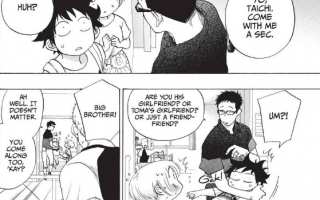“The Boy and the Heron” Review
When I was a kid in 2006, I remember watching Cartoon Network and seeing a commercial for a month-long event that Toonami would be putting on called “A Month of Miyazaki.” Every week, Toonami would air one film made by Hayao Miyazaki, and while I only watched Nausicaa of the Valley of the Wind in its entirety, the event left a lasting impact on me. From then on, I became a fan of Hayao Miyazaki, one of the greatest minds in animation history. Combining thought-provoking themes and ideas with otherworldly animation, I became a huge fan of Miyazaki. So when I heard that he was coming out of retirement to make one more film, I knew that I had to go and see it in theaters. And while it doesn’t have the high stakes of Nausicaa or Princess Mononoke, The Boy and The Heron is an excellent film for one reason: it’s personal for Miyazaki.
Miyazaki’s First Memories Are of Fire
At its core, The Boy and the Heron is a story about grief and how we deal with it. Taking place in Japan in the middle of World War II, the film centers around Mahito, a young boy who, after losing his mother to the carnage, is forced to move with his Father to their Mom’s family home in the country. While trying to deal with the massive upheaval in his life, Mahito stumbles upon the ruins of an abandoned tower. More importantly, though, he runs into a gray heron that seems determined to annoy him. However, things take a turn when the Heron begins to speak, telling him to go to the tower if he wants to see his Mom again. From there, Mahito gets isekaied into a strange and magical world that will test him in more ways than one.
When I first read the synopsis to this movie, one thought went through my mind: this movie is different. It contains most of the hallmarks found in Miyazaki’s other films. The abhorrence of war and the affect it has on people isn’t absent from the movie. However, rather than being focused exclusively on that or about why we should protect the environment, The Boy and the Heron deals mainly with coping with grief. While he didn’t lose his parents during World War II like Mahito lost his mother, the latter’s relationship is meant to parallel the one Miyazaki had with his Mom. Mahito adored his mother, and after seeing her die, he retreats into himself to cope with the loss. In a way, his eventual decision to travel into the other world via the tower is merely an extension of that retreat inward.
Don’t Get Too Sucked into a Fantasy World
Part of the reason why the Isekai genre is so popular is because it’s a form of extreme escapism. When things in life aren’t going the way we want, we tend to start wishing we could be living someplace more interesting. It’s a coping mechanism to help us get through rough times in our lives. Thus, it should come as no surprise that when Mahito thinks he can get his mom back, he doesn’t hesitate to follow the Heron into the tower. Unfortunately, though, he quickly realizes that there are some things that we can’t get back, no matter how much we may want them. While the events of the film see Mahito accept that what he’s lost is gone forever (his Mom), he shouldn’t let his grief blind him to what he still has.
As Mahito realizes throughout the film, he still has people in his life that he cares about. Case in point, there’s his Mom’s younger sister, now married to his dad and carrying his child. At first, Mahito acts cold to her, seeing her as a poor attempt to replace his own mom. By the end of the film, though, Mahito understands that his Aunt isn’t trying to replace her sister. More likely, she’s suffering just as much as he and his father are, and that they all need to stick together on this.
If this is the Swan Song of Miyazaki, then it is Glorious!
Now, the film can get a little out there, even by the standards of a Miyazaki film, and it doesn’t always make its message clear. However, when you look at from the perspective of Miyazaki himself and his own life, things get a little clearer. The start of his life wasn’t easy, and he had to witness things no one should see at such a young age. But instead of letting them drag him down, he embraced life’s positives rather than the negatives. Mahito could allow his mother’s death and his Dad marrying her sister make him bitter and resentful, but by the film’s end, he chooses to embrace his new family. In other words, he’s saying we can choose to be better than the world we live in. And by doing so, we can help make the world a little better for the next generation.
While I wouldn’t rate this as among Miyazaki’s best films, I can’t deny that it probably holds a lot of significance to him. If this is truly going to be his swan song, then its best for him to tell a story inspired by his own life. And in this regard, The Boy and the Heron soars. It’s one of the best films of the year.



